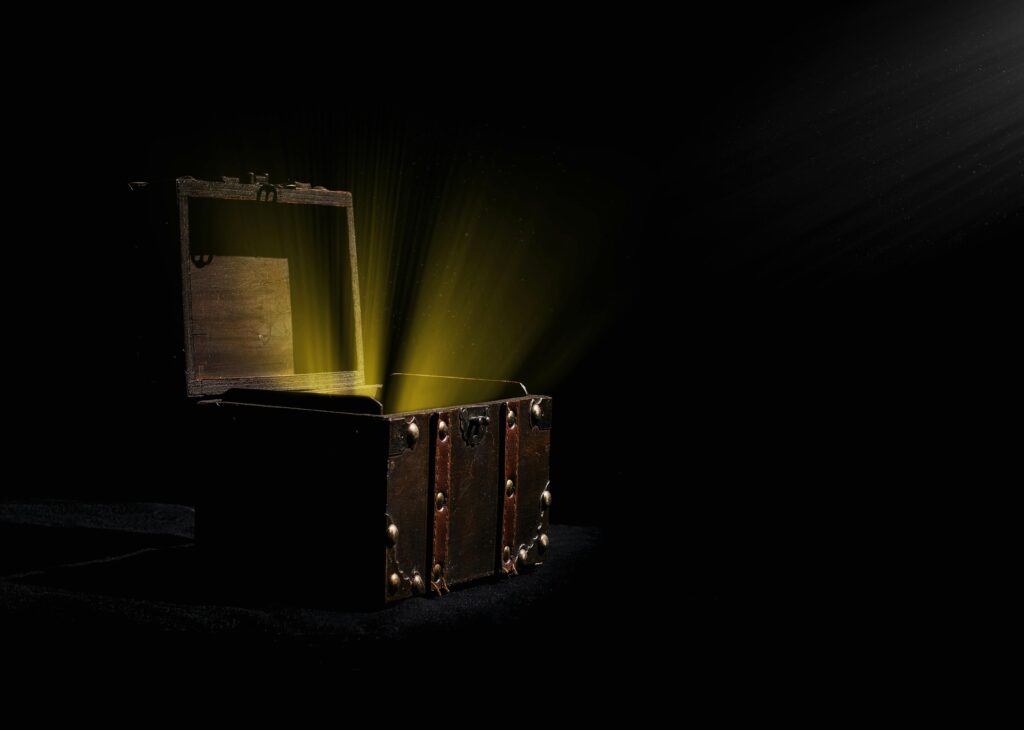
Whether or not a trust is required to pay taxes completely depends on the type of trust it is. In Washington State, and generally around the United States a Living Revocable Trust is NOT specifically taxed as an entity – and this is the primary type of Trust that is used for estate planning purposes. So without further ado, let me talk a bit about this type of Trust and how it actually helps us with taxes and costs.
Without getting into the technical legal jargon of what a Living Revocable Trust does and how it “holds” money and property in its metaphysical container, the easiest way to explain its magic is to say this type of trust is a Treasure Chest for families.
A Treasure Chest is just that – a container that holds valuable things, to which only certain people have a key. A Living Revocable Trust is exactly this – a place to put your valuable real estate and money where only a Trustee holds the key. The Trustee can be the person who puts the valuable items into the Treasure Chest Trust or it can be another identified and appointed individual who the Grantor really trusts (hence the name Trustee!).
A Living Revocable Trust is a Treasure Chest that Passes Property to the Next Generation Free of Probate Court and State Involvement

The Treasure Chest Trust’s entire job is to hold property for a family, so the property can pass to the next generation without state court involvement and intervention. This Treasure Chest Trust, if designed correctly and thoughtfully by an experienced estate plan attorney, can help those who inherit from it, from paying accidental income and capital gains taxes.
The Treasure Chest Trust also prevents significant other costs that result from assets having to be transferred through the Probate Court process. And finally, but most importantly, the Treasure Chest Trust protects families with minor children – ensuring that if something happens to the parents while the children are still too young to hold property themselves, the Treasure Chest Trust is filled with the resources necessary to take care of the kids immediately, and a trusted adult is appointed to manage those resources for them.
The Treasure Chest Trust itself though, never pays any income taxes while those who put the Treasure in it are alive. While the owner of the Treasure Chest Trust is alive they put valuable property into the trust that they already paid taxes on or are paying taxes on as an individual – and all of the property in the Treasure Chest is associated with their personal social security number for government tracking purposes. After the Grantor (i.e. the person who put Treasure/Property into the Treasure Chest Trust) dies, the Trust will pay any Estate taxes owed in Washington State or to the Federal Government, and it will also pay the Grantor’s final income taxes and other outstanding collectable debts from its pot of proverbial gold i.e. the real estate and cash assets placed into the Living Revocable Trust while the grantor was alive.
 In Washington State, those who inherit will not pay any inheritance tax on what the Treasure Chest Trust gives them, however, if the Trust distributes real estate directly to a person and that heir (i.e. person receiving the real estate via inheritance) receives the real estate into their name personally – that person will have to pay capital gains taxes on that inherited real estate. Because the IRS sees that inheritance of real estate into the heir’s name only as a Capital Gain (a cash value income gain), which triggers an income tax. And this is why you want to work with an experienced estate planning attorney to set up your Living Revocable Trust – to make sure your Treasure Chest Trust is set up in a way that when you die, it gives birth to other, even more secure Third Party Treasure Chest Trusts (Trusts given as a gift of inheritance) for your loved ones after you are gone.
In Washington State, those who inherit will not pay any inheritance tax on what the Treasure Chest Trust gives them, however, if the Trust distributes real estate directly to a person and that heir (i.e. person receiving the real estate via inheritance) receives the real estate into their name personally – that person will have to pay capital gains taxes on that inherited real estate. Because the IRS sees that inheritance of real estate into the heir’s name only as a Capital Gain (a cash value income gain), which triggers an income tax. And this is why you want to work with an experienced estate planning attorney to set up your Living Revocable Trust – to make sure your Treasure Chest Trust is set up in a way that when you die, it gives birth to other, even more secure Third Party Treasure Chest Trusts (Trusts given as a gift of inheritance) for your loved ones after you are gone.
Inheriting Via a Third Party Trust Ensures Your Heirs Do Not Have to Pay Additional Income Taxes on What They Receive From You
 If someone inherits a Third Party Treasure Chest Trust with real property or money inside of it they do not have to pay any capital gains or income taxes on that real estate. The IRS does not associate the asset with your heir’s social security number, so it does not charge the heir any income tax on it. It is as if it doesn’t exist for your personal income taxes! Poof! Magic! Further, the Trust created by a Trust allows for asset protection from creditors, lawsuits, and divorce (i.e. future ex-spouses).
If someone inherits a Third Party Treasure Chest Trust with real property or money inside of it they do not have to pay any capital gains or income taxes on that real estate. The IRS does not associate the asset with your heir’s social security number, so it does not charge the heir any income tax on it. It is as if it doesn’t exist for your personal income taxes! Poof! Magic! Further, the Trust created by a Trust allows for asset protection from creditors, lawsuits, and divorce (i.e. future ex-spouses).
In other words, if you have a really good estate plan, your one Living Revocable Trust i.e. Treasure Chest is going to fund additional Third Party Treasure Chests Trusts after you are gone. This way your Living Revocable Trust can give birth to many Treasure Chests that protect your 3rd party beneficiaries i.e. your heirs from capital gains tax and other Surprise! Income tax pitfalls.
A Living Revocable Treasure Chest Trust Prevents Your Family From the Hassle and Expense of the Probate Court System
Ultimately, the biggest benefit of the Treasure Chest Trust is not the tax savings however (even though this is a really good thing). The best thing about creating a Living Revocable Trust to protect your estate is that it prevents your family from having to go to court, hire a probate attorney, and deal with all the other expenses of the Probate System. It reduces the time spent after someone dies from 9 months to 2 years of civil litigation, down to 2 weeks to 2 months of a private individual taking the action necessary to do what is immediately in front of them.
Imagine, if something happened to you and you have young children? Do you want them to have to wait two years to get access to your resources? Who will take care of them in the meantime? And do you want the court to appoint those persons who eventually manage what you leave them? No, I don’t think so. You want to make those decisions while you are alive, so if the unimaginable happens your children are taken care of – and setting up an estate plan with an experienced estate planning attorney that includes a Treasure Chest Trust is exactly the way to do that.

Have More Questions? Reach Out to an Experienced Estate Planning Attorney
If you have more questions about creating your very own Treasure Chest Trust or the intricacies of estate tax and estate planning – you don’t have to wait to get your questions answered. Please book a call today to discuss your individual situation with an experienced estate planning attorney by clicking the link below.



